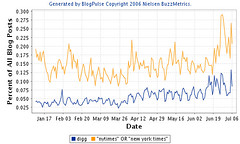LeeAnn Prescott of Hitwise (which I used to consult for) has a great post reflecting on the highly misguided “Is Digg.com as big as than the NYTimes.com” meme. Digg is a social news aggregator where members of its community vote on which stories will be featured on the front page; NYTimes is the online version of the New York Times. LeeAnn says:
According to the Hitwise US sample of 10 million internet users, Digg ranked at #101 in the News & Media category in for the week ending July 1, 2006. The share of page impressions for the NY Times was 19 times greater than for Digg for that week. If I put the NY Times on the same chart as Digg, Digg’s traffic would look tiny and relatively flat, even though its share of page impressions has grown substantially in the past several months, increasing 51% from February to June 2006. Digg did receive a greater share of page impressions in June than Times Select, the subscriber-only section of the NY Times, and long ago eclipsed Slashdot, as you can see on the chart below.
LeeAnn then says:
Secondly, Digg received 63% of its traffic from search engines during the four weeks ending 7/1/06, compared to 16% for the NY Times, and analysis of the actual terms reveal the differences in how people are using the sites. Very little of Digg’s search volume was navigational, indicating low brand recognition. Take a look at the top 20 search terms sending visits to Digg shown below, and you’ll get an idea of their audience – definitely young and tech focused. Half of the NY Times’ top 20 search terms in the same period were navigational terms like ‘newyorktimes’ and they accounted for 13% of its search volume. Other terms sending visits to NY Times in that period included ‘star jones,’ ‘world cup,’ ‘tony awards’ and ‘obituaries,’ further demonstrating the wide gulf between Digg users and NY Times users.
Then I commented on LeeAnn’s blog: While Digg DOES have an incredibly disproportianate impact on search engines and blog memes in the tech and adolescent world, it certainly is WAY far from being a mainstream phenomenon, which is what many would like to believe it has become (including Digg itself and its members). Its massive rise in influence within its niche, though, will likely have some influence on broader discussions and digital media. If I were an online publisher, or a PR person, I’d be watching very closely how this idea catalyst works.
I also think it’s important to note that the behavior of the Digg netork suffers from a phenonomenon similar to the U.S. government: it’s run by and reflects extremists who sometimes have too much time on their hands. Extreme bloggers. Extreme adolescents. Extreme techies. Extreme fans of strange news. Extreme fans of sensational headlines and stories. I admit I fall into a few of those extremist categories.
There is a tiny epicenter of Digg members which jockeys intensively for the gratification of being Dugg. I’m not saying the Digg system is flawed or bad, because I actually think it’s awesome and helps me discover a lot of interesting content. However, it’s not a utopian democracy — by and for the will of the people. It is a practical democracy where a few hand-raisers passionately do most of the work, where their motivations are guided by agenda and ego.
LeeAnn’s set-the-record-straight post also reflects another trend: that discussion memes can go in slanted directions, fueled by an abundance of free data tools (like Alexa and Google Trends) and half-baked analyses. Free data tools are great, but they should be used with greater caution. They’re extremely valuable, but they’re better used for demo-ing limited functionality of higher-grade pro tools, or just discovering early-stage insights and directional trends (which you would then verify by mutliple, other, more reliable tools).
Finally, here’s one final piece of directional insight to ponder: Digg’s share of mentions in the blogosphere HAS been catching up to the NYTimes. Provided the blogosphere’s disproportionate influence on agenda-setting and outcome, perhaps reach or audience size is the wrong comparison to be asking in the first place. What do you think?


